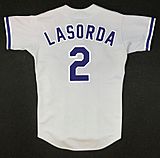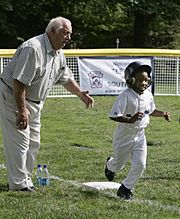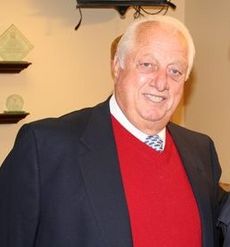Tommy Lasorda facts for kids
Quick facts for kids Tommy Lasorda |
|||
|---|---|---|---|
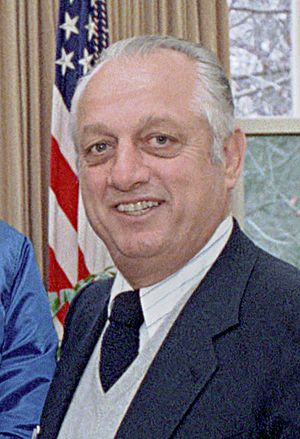
Lasorda at the White House in 1981
|
|||
| Pitcher / Manager | |||
| Born: September 22, 1927 Norristown, Pennsylvania, U.S. |
|||
| Died: January 7, 2021 (aged 93) Fullerton, California, U.S. |
|||
|
|||
| debut | |||
| August 5, 1954, for the Brooklyn Dodgers | |||
| Last appearance | |||
| July 8, 1956, for the Kansas City Athletics | |||
| MLB statistics | |||
| Win–loss record | 0–4 | ||
| Earned run average | 6.48 | ||
| Strikeouts | 37 | ||
| Managerial record | 1,599–1,439 | ||
| Winning % | .526 | ||
| Teams | |||
|
|||
| Career highlights and awards | |||
|
|||
| Induction | 1997 | ||
| Election Method | Veterans Committee | ||
Tommy Lasorda (born Thomas Charles Lasorda; September 22, 1927 – January 7, 2021) was a famous American professional baseball player and manager. He is best known for managing the Los Angeles Dodgers in Major League Baseball (MLB) for 20 years, from 1976 to 1996. Because of his amazing career as a manager, he was chosen to join the National Baseball Hall of Fame in 1997.
Before becoming a manager, Lasorda played as a pitcher for the Brooklyn Dodgers in 1954 and 1955, and for the Kansas City Athletics in 1956. He also worked as a coach for the Dodgers from 1973 to 1976. As a manager, Tommy Lasorda led the Dodgers to win two World Series championships. He was also named the National League Manager of the Year twice. The Dodgers honored him by retiring his uniform number 2, meaning no other player on the team can ever wear that number again.
Contents
Playing Baseball
Tommy Lasorda finished high school in Norristown, Pennsylvania, in 1944. He started his professional baseball journey in 1945 with the Philadelphia Phillies. He took a break from baseball in 1946 and 1947 to serve in the United States Army.
When he returned to baseball in 1948, he played for the Schenectady Blue Jays. On May 31, 1948, he set a professional record by striking out 25 players in a 15-inning game! He even hit the winning run himself in that game. He also played in the Cuban League for teams like Almendares and Marianao.
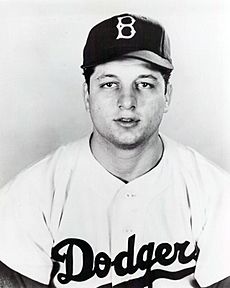
The Brooklyn Dodgers picked Lasorda to join their team in 1949. He played for their minor league team, the Montreal Royals, for several years. He finally made his major league debut with the Brooklyn Dodgers on August 5, 1954. In one game on May 5, 1955, he threw three wild pitches in a single inning, which tied a major league record. After that game, he was sent back to the minor leagues and never pitched for the Dodgers again.
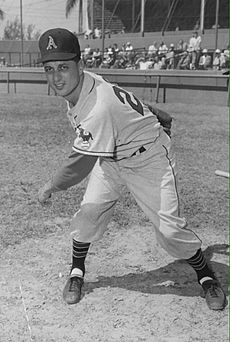
Before the 1956 season, Lasorda was traded to the Kansas City Athletics. He later played for the New York Yankees' minor league team, the Denver Bears. While playing for the Bears, he learned a lot from his manager, Ralph Houk. Houk taught him that treating players well makes them perform their best. Lasorda said, "He taught me that if you treat players like human beings, they will play like Superman."
Lasorda returned to the Montreal Royals from 1958 to 1960. He became the pitcher with the most wins in the team's history, with 107 wins and 57 losses. In 2006, he was honored by being inducted into the Canadian Baseball Hall of Fame. He finished his major league playing career with a record of 0 wins and 4 losses in 26 games.
Coaching Baseball
Minor League Coaching
After his playing career, Tommy Lasorda became a scout for the Dodgers in 1960. A few years later, in 1966, he started managing minor league teams, including the Pocatello Chiefs and the Ogden Dodgers. He wanted his players to believe in themselves, so he had them write letters to the Los Angeles Dodgers' major league players, saying they would replace them one day!
He then managed the Dodgers' top minor league team, the Spokane Indians, and later the Albuquerque Dukes. His 1972 Dukes team won the Pacific Coast League Championship. Lasorda also managed a team in the Dominican Winter Baseball League, leading them to win the 1973 Caribbean Series title.
Dodgers' Third-Base Coach
In 1973, Lasorda joined the main Los Angeles Dodgers team as the third-base coach. He worked under the famous manager Walter Alston for four seasons. Everyone believed that Lasorda would be the next Dodgers manager, and he even turned down other managing jobs to stay with the Dodgers.
Managing the Dodgers
Tommy Lasorda became the manager of the Los Angeles Dodgers on September 29, 1976, after Walter Alston retired. When asked if he felt nervous replacing such a legendary manager, Lasorda famously said, "No, Vin, I'm worried about the guy who's gonna replace me. That's the guy who's gonna have it tough."
As the Dodgers' manager for 20 years, Lasorda had an impressive record of 1,599 wins and 1,439 losses. He led the team to win two World Series championships, in 1981 and 1988. His teams also won four National League pennants and eight division titles. He managed in 61 postseason games, which was one of the highest totals for any manager at the time. He also managed in four All-Star games.
Lasorda was known for developing young talent. He managed nine players who won the National League Rookie of the Year Award. These included stars like Fernando Valenzuela, Mike Piazza, and Hideo Nomo.
His final game as manager was a 4–3 win against the Houston Astros on June 23, 1996. The next day, he had a heart attack and had to retire. His former player, Bill Russell, took over as manager. Lasorda's 1,599 career wins rank him among the top managers of all time.
After Managing the Dodgers
After retiring from managing in 1996, Lasorda became a vice president for the Dodgers. He also served as the interim General Manager for a short time in 1998. Later, he became a senior vice president, helping the team with scouting and advising.
In 2000, Lasorda came out of retirement to manage the U.S. national baseball team at the Summer Olympics in Sydney, Australia. He led the American team to win the gold medal, beating the strong Cuban team. This made him the first manager to win both a World Series and an Olympic gold medal.
He continued to be involved with baseball, even coaching third base in the 2001 Major League Baseball All-Star Game. In 2004, he became a special advisor to the Dodgers' chairman, helping with player development and representing the team. In 2008, he even briefly managed a Dodgers team during spring training in Florida.
Honors and Awards
 |
|
| Tommy Lasorda's number 2 was retired by the Los Angeles Dodgers in 1997. |
Tommy Lasorda was inducted into the Baseball Hall of Fame in 1997, in his very first year of eligibility. The Dodgers honored him by retiring his uniform number 2 on August 15, 1997. They also renamed a street at their training facility, Dodgertown, to "Tommy Lasorda Lane." In 2014, a restaurant called "Lasorda's Trattoria" opened at Dodger Stadium.
Some of his other awards include:
- The Sporting News Minor League Manager of the Year (1970)
- UPI and Associated Press (AP) Manager of the Year (1977)
- AP Manager of the Year (1981)
- AP and Baseball America Manager of the Year (1988)
- Sporting News Co-Manager of the Year (1988)
- Amos Alonzo Stagg Coaching Award (2000)
- A minor planet, 6128 Lasorda, was named after him.
- Bob Feller Act of Valor Award (2014)
In 2020, the baseball field at the University of Pennsylvania was named after Lasorda.
Public Persona
Tommy Lasorda was famous for his lively personality and strong opinions about baseball. He was known for being very loyal to his players. He believed that managers should be friends with their players off the field, which he felt made them more loyal to him. He also made sure to know the names of his players' wives and children, and would often ask about them.
Lasorda also appeared in movies and TV shows. He voiced a character named Lucky Lasorta in the film Homeward Bound II: Lost in San Francisco (1996). He had a cameo in the movie Ladybugs (1992) with Rodney Dangerfield. He also played the Dugout Wizard in the children's TV show The Baseball Bunch. He appeared as himself in many other TV shows, including Who's the Boss?, CHiPs, and Everybody Loves Raymond.
In 2005, President George W. Bush asked Lasorda to be a delegate for the U.S. at the World Exposition in Japan. In 2008, the Japanese government gave him the Order of the Rising Sun, Gold Rays with Rosette, a high honor, for his contributions to Japanese baseball.
Personal Life and Passing
Tommy Lasorda was born on September 22, 1927, and grew up with four brothers. His father was an Italian immigrant. Tommy was a practicing Roman Catholic. He married his wife, Jo, in 1950. They lived in Fullerton, California, for over 50 years and had two children. They named a gymnasium and youth center in Yorba Linda, California, in memory of their son, Tom Jr., who passed away in 1991.
Lasorda was also the godfather to Thomas Piazza, the younger brother of Baseball Hall of Famer Mike Piazza. He was also the godfather to Alex Avila, another baseball catcher.
On June 3, 2012, when he was 84, Lasorda was hospitalized after having a heart attack, but it was not very serious. In November 2020, he was hospitalized again for heart problems and was in serious condition. He was released from the hospital but sadly passed away two days later, on January 7, 2021, at his home. He was 93 years old. Many buildings in Los Angeles, including City Hall and Dodger Stadium, were lit up in blue to honor him. Flags at Dodger Stadium were flown at half-staff.
On September 21, 2021, the Dodgers announced that Tommy Lasorda's wife, Jo, had also passed away at the age of 91.
See also
- List of Major League Baseball managers by wins
- Tommy Lasorda Baseball
 | Victor J. Glover |
 | Yvonne Cagle |
 | Jeanette Epps |
 | Bernard A. Harris Jr. |


